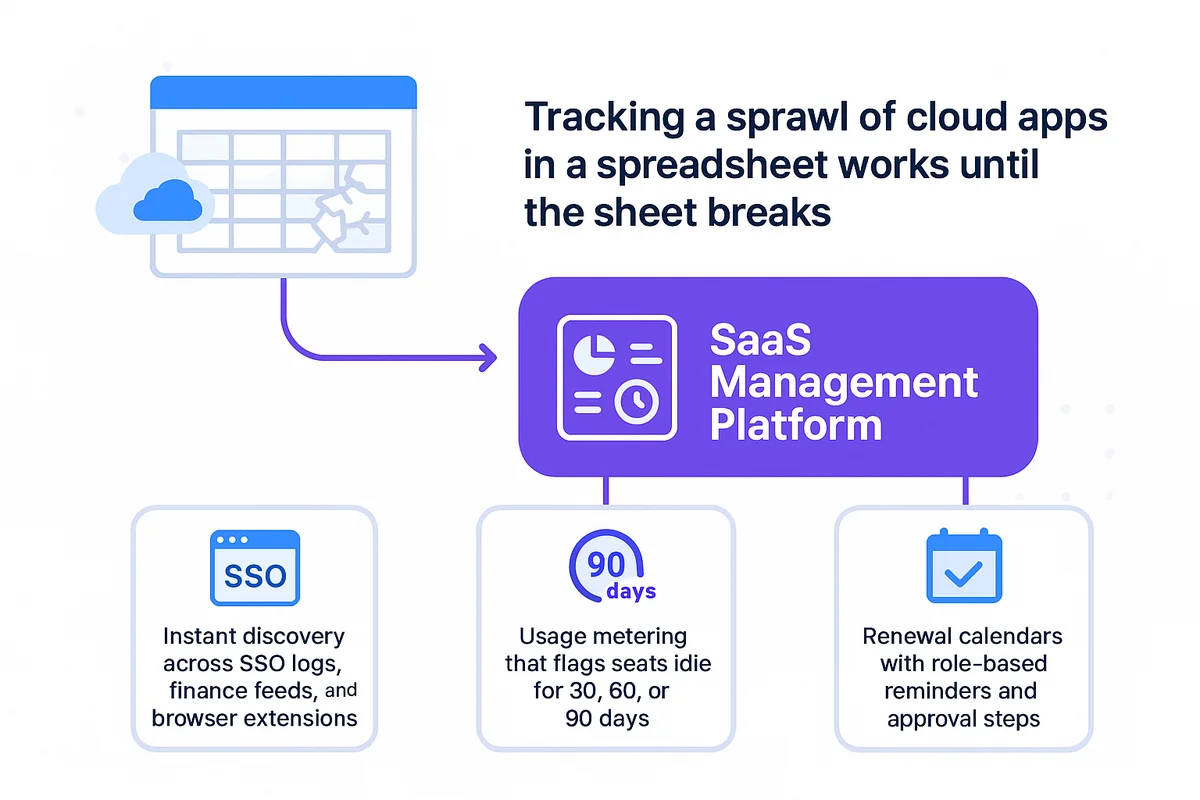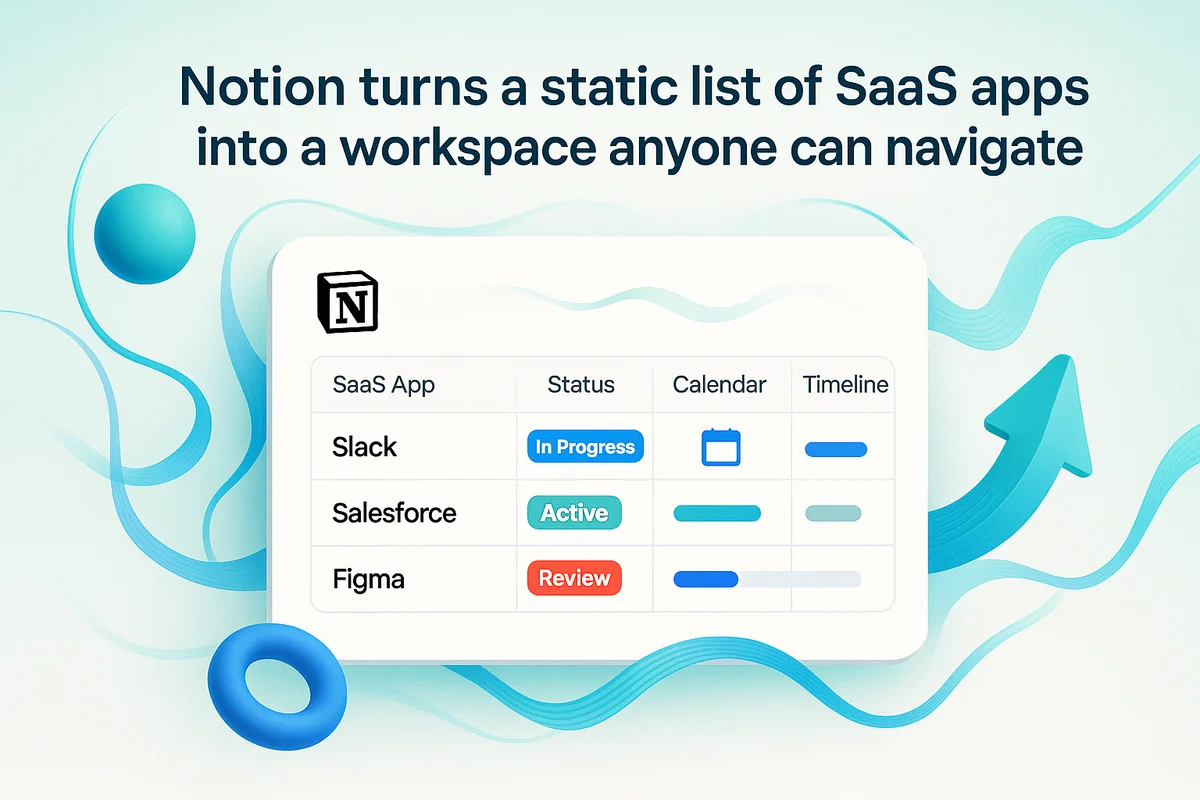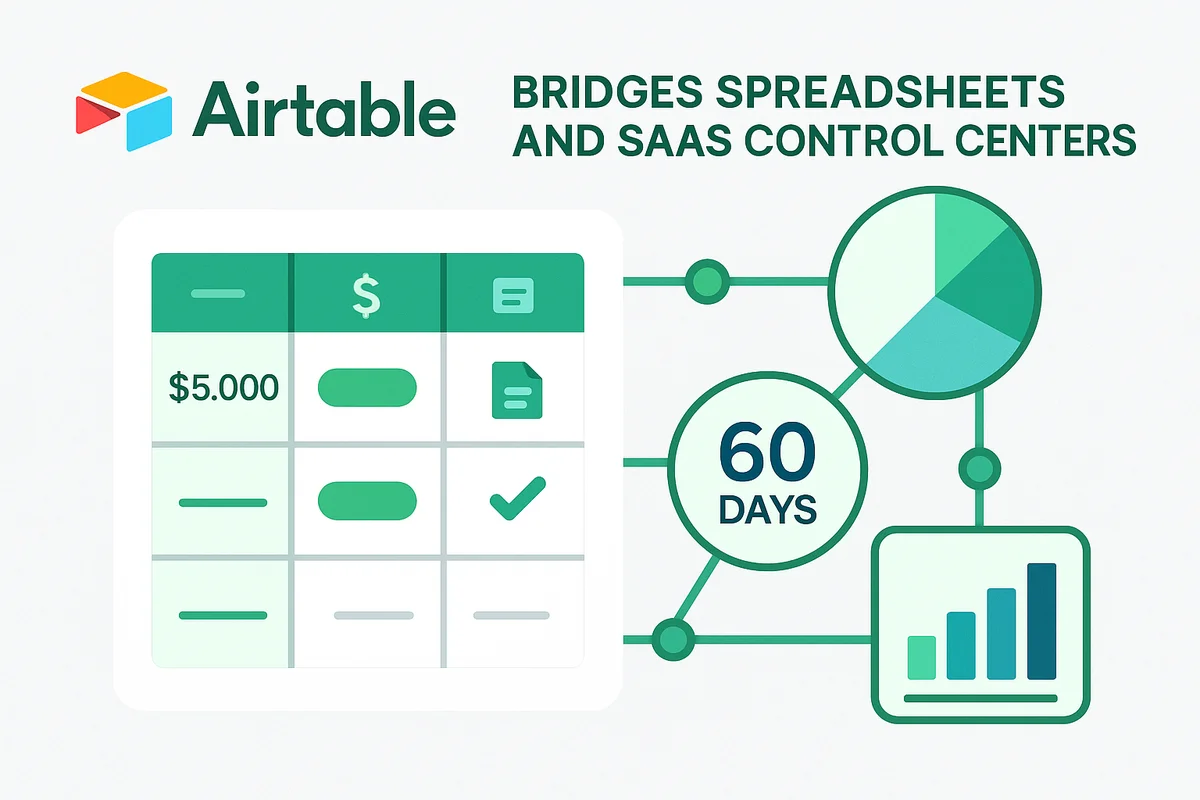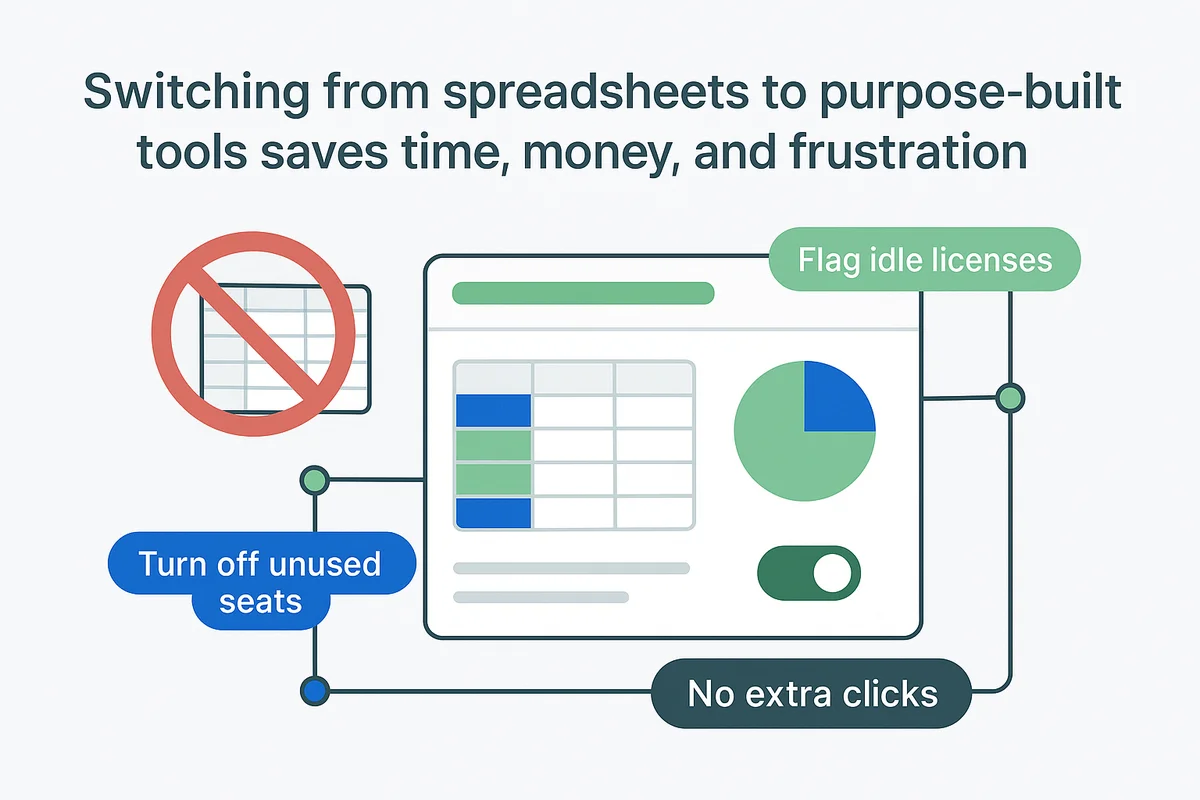3 Smarter Alternatives to Google Sheets for Tracking SaaS Tools
For years, spreadsheets carried SaaS inventories farther than most teams thought possible. Yet once dozens of employees start charging software to corporate cards, the grid becomes a liability. Copy-paste mistakes pile up, ownership shifts, and renewal dates fall through the cracks.
Finance and IT leaders keep asking for real-time discovery, timely renewal alerts, and clear cost insights without adding headcount. The wish list points to life beyond Sheets and into tools built for the job. Teams typically consider three practical options, and each promises lower waste but asks for different trade-offs in setup, automation, and price. Pinpoint where your organization falls on that spectrum; governance improves from there.
This article lines up dedicated SaaS management platforms, Notion, and Airtable so you can match tools to your budget, scale, and appetite for automation.
Table of Contents
- Dedicated SaaS Management Platforms
- Notion
- Airtable
- Conclusion
- Audit your company's SaaS usage today
Dedicated SaaS Management Platforms
Tracking a sprawl of cloud apps in a spreadsheet works until the sheet breaks.
SaaS management platforms fill that gap by pulling in activity your grid misses. They stream SSO logins, expense lines, and contract terms into one place, then map every user to every license without waiting for a monthly CSV.
What appears once the feeds settle is just as revealing. Dashboards flag unused tools in plain language, not pivot tables, and the renewal timer starts as soon as the contract file syncs. After that, the system can post tasks to Slack or a ticket queue so someone looks at the agreement before the auto-renew notice lands.
- Instant discovery across SSO logs, finance feeds, and browser extensions
- Usage metering that flags seats idle for 30, 60, or 90 days
- Renewal calendars with role-based reminders and approval steps
- Off-boarding workflows that remove access and reclaim licenses while logging proof for auditors
Each workflow feeds the next, giving procurement, finance, and security a living source of truth rather than six stale tabs. The impact shows up on the balance sheet: Zylo reports customers cut license waste by 10 to 20 percent within a year once automation replaces manual checks.
Even with that upside, the added firepower comes with real costs. Subscriptions often start near five dollars per employee per month, and rolling out a new system forces teams to adjust old processes. Because the platform owns the data model, exporting every field back to Sheets can be messy if you decide to switch vendors.
For organizations juggling more than 100 apps, decentralized buying, or SOC 2 audits, those trade-offs usually pencil out. Automation guards against human error, compliance boxes get ticked without late-night scrambles, and finance finally sees a complete SaaS spend picture before budgets lock. The result: fewer surprises, tighter license spend, and a lighter lift for everyone who once babysat a color-coded spreadsheet.

Notion
Notion turns a static list of SaaS apps into a workspace anyone can navigate.
Teams sick of scrolling massive Sheets can build a linked database in Notion that holds every app, date, contract, and owner. Each record sits at the center and can roll up into Kanban status boards, color-coded calendars, or a timeline of upcoming expirations. One view lets finance tally license spend; another helps security confirm SOC 2 paperwork, and nobody juggles extra tabs. Because every view points to the same rows, an edit in one place ripples everywhere without copy-paste mistakes.
Context lives right beside the data, beating the old “open a second doc” shuffle. Ops leads often embed onboarding checklists, access policies, and vendor questionnaires in the very row that tracks Slack or Figma. New hires learn why the tool exists, who owns it, and how to request access. The result is smoother collaboration and fewer midnight pings asking, “Do we still need this?”
Even with all those perks, someone eventually pays a manual tax for upkeep. Notion will not read your SSO logs, analyze Amex statements, or count unused seats. Someone must key in contract values and license counts, or at least upload a weekly CSV. If dates slip, reminder automations fire at the wrong time or never at all. A 2023 Productiv report found the average 100-person company now juggles 40 apps, so stale fields pile up fast.
Use Notion when the goal is shared visibility, not hands-free enforcement. It suits startups and lean IT teams that manage fewer than 60 apps and prize context over raw telemetry. Common winning workflows include:
- Drafting procurement questions once, then cloning the template for each new tool
- Tagging apps by department so budget owners see only what they control
- Turning GDPR redlines into tasks that sit alongside the master contract
Grow past those needs and the real-time insights of a dedicated SaaS management platform start to look worth the added cost.

Airtable
Airtable bridges the gap between spreadsheets and dedicated SaaS control centers. It feels familiar to anyone who has dragged cells in Excel, yet its underlying database engine links tables the way finance, procurement, and IT already think about owners, contracts, and renewal stages.
Columns can store rich field types such as currency, attachments, single-select tags, and checkboxes, so spend data and contract PDFs live side by side instead of hiding in scattered folders. Those fields turn into flexible parts for Kanban boards that track renewal status, Gantt charts that preview upcoming expirations, or timeline views that map vendor onboarding against hiring plans without a single pivot table.
Several time-saving helpers appear the moment you open a new base:
- Forms that non-tech colleagues can complete to request new apps or update usage counts
- Automations that fire an email or Slack ping when a renewal date hits 60 days out
- A marketplace where scripts or connectors pull card charges from Brex or invoices from NetSuite into the same base
Even so, reliable numbers still rely on humans entering license totals or cost per seat. Advanced flows, like auto-deprovisioning an unused account, often depend on Zapier or custom scripts that someone must write, test, and maintain. Each extra integration adds subscription fees and security reviews, which can erode the savings you expected.
Midmarket teams juggling 40 to 80 SaaS apps usually see the fastest return. They want relational reporting that Google Sheets can’t handle but aren’t ready to buy a dedicated management platform that starts at five figures. When finance needs a quarterly roll-up of spend by department, IT can spit out a grouped view in minutes; when security audits arrive, linked tables reveal who still has admin rights. As the stack grows past 100 apps, however, manual data upkeep becomes a drag, and the case for automated discovery tools strengthens.

Conclusion
Switching from spreadsheets to purpose-built tools saves time, money, and frustration. Dedicated SaaS management platforms handle discovery automatically, flag idle licenses, and turn off unused seats with no extra clicks. Notion offers linked databases that blend knowledge and tracking, yet most upkeep remains manual, while Airtable provides modest automations and grid views that work until the app list balloons, accuracy still depends on humans.
Choose the approach that fits your scale and risk tolerance, and let the spreadsheet retire before stray cells drain the budget.

Audit your company’s SaaS usage today
If you’re interested in learning more about SaaS Management, let us know. Torii’s SaaS Management Platform can help you:
- Find hidden apps: Use AI to scan your entire company for unauthorized apps. Happens in real-time and is constantly running in the background.
- Cut costs: Save money by removing unused licenses and duplicate tools.
- Implement IT automation: Automate your IT tasks to save time and reduce errors - like offboarding and onboarding automation.
- Get contract renewal alerts: Ensure you don’t miss important contract renewals.
Torii is the industry’s first all-in-one SaaS Management Platform, providing a single source of truth across Finance, IT, and Security.
Learn more by visiting Torii.

